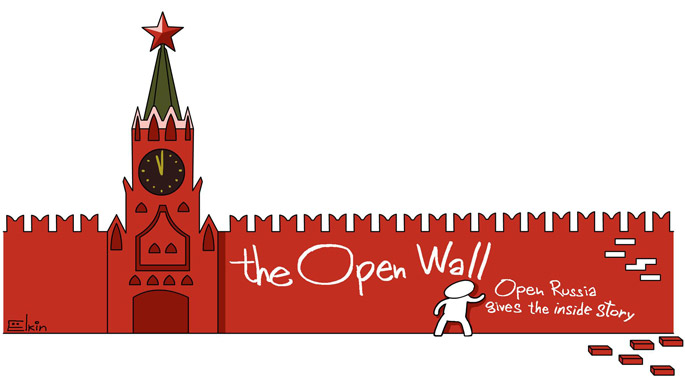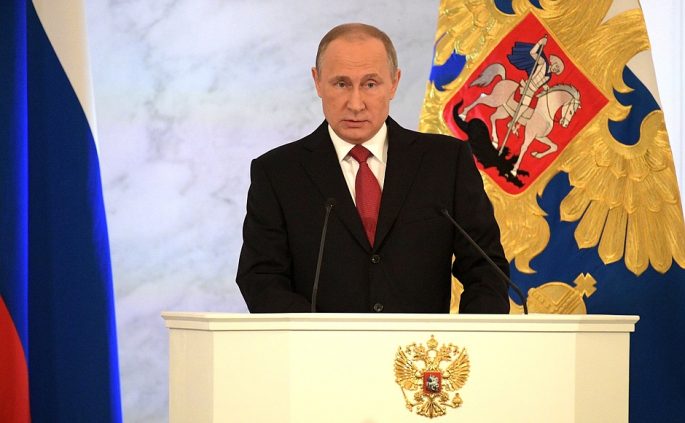Paraphrasing Emperor Paul I

Paraphrasing Emperor Paul I
We almost forgot to mention it, what with the hacking and stuff, but on December 1, Vladimir Putin delivered his annual address to the Federal Assembly.

Contrary to widespread expectations, he failed to announce any new crusade. Seventeen years into Putin’s reign, we cannot but interpret this as welcome news. Nonetheless, everything could change virtually overnight – indeed, our beloved president hedged his commitment to peace with so many caveats that outright war still seems nigh at hand.
The president’s keynote speech, which focused on Russia’s domestic socio-economic problems, met with a predominantly critical response from independent experts. “It was a completely routine and boring text – boring for Putin first and foremost,” said political analyst Stanislav Belkovsky.
Online, the public reacted in far more unrestrained fashion:
(Elsiyara Yashchuk) “Total drivel… he’s some sort of alien who’s totally removed from the lives of regular mortals”
(Indira Mironova) “He’s speaking of something ephemeral for the benefit of his coterie! And every word can be disproved”
(Vladimir Kudelya) “This harks back to Soviet days. Lies, and nothing but”
Naturally, those in attendance at the Kremlin’s St George Hall had a rather different assessment. LDPR leader Vladimir Zhirinovsky, for example: “His tone conveyed the sentiment that […] yes, we have problems, we’re going to solve them, but let’s not be having any more revolutions or perestroikas or upheavals.”
But what did he actually say, we hear you ask.
- Putin: I believe that the course we have taken in developing the political system and the institutions of direct democracy, and in making elections more competitive, is completely justified.
According to political analyst Tatiana Stanova, Putin’s speech was indicative not of his commitment to democracy, but, rather, of his desire to hail the current status quo as democratic: “Following this logic,, the development of democratic institutions means the preservation of the ruling party’s dominant position, the subordination of Parliament to the Kremlin […], and monopolies on history and politics.”
- Putin: The IT industry is one of our most rapidly developing sectors, which is heartening. […] I’m confident that the IT industry can become one of Russia’s key export sectors within the next decade.
Dmitry Butrin, the economics editor of Kommersant newspaper, declared that the attention suddenly being paid by the state to the IT industry is, if anything, “somewhat unwanted. In a normally operating economy, the head of state would most likely say ‘they need to increase IT exports,’ not ‘we need to increase IT exports.’ It’s a rare government that believes it must be directly involved in the production of software code and its sales on foreign markets – software companies are perfectly capable of rising to the challenge themselves.”
- Putin: I instruct that the Government, working together with leading business associations, develop, by no later than May 2017, a detailed action plan covering the period to 2025; the implementation of this plan will make it possible to achieve economic growth rates higher than in the [rest of the] world as early as 2019−2020.
Back in the day, around a thousand experts contributed to the development of the socio-economic Strategy 2020, with many of them receiving awards for their trouble, yet the strategy itself was eventually consigned to the trash heap. The president’s ambition was lampooned by a Vedomosti reader, with the handle dryrussian: “You can’t launch criminal proceedings against the economy, nor can you pass laws requiring it to start growing overnight. Threatening it is futile, bribing it unworkable, pressuring its relatives impossible… So all you can do is reiterate the fact that it owes something to someone.”
- Putin: I propose providing high-speed internet access to every hospital and outpatient clinic in the country over the course of the next two years. This will enable doctors based even in the remotest towns and villages to take advantage of the possibilities afforded by telemedicine.
Novaya Gazeta reader Ivan Arestov is not so sure: “For god’s sake […], our local outpatient clinic [in Moscow] doesn’t even have an X-ray machine. The old one broke and they’ve not bought a new one.”
- Putin: “Unfortunately, it has become common practice here to raise a fuss in the media over these so-called headline-making [corruption] cases. Law enforcement agency personnel are themselves often guilty of this. Corruption isn’t some sort of show – it calls for professionalism and a serious,responsible approach.”
Does he mean he wants corruption to be organised professionally? Surely, it is already? The true meaning of the president’s words was parsed by political analyst Yekaterina Shulman: “This will serve to placate anyone who’s afraid of the uncontrollable siloviki [men in uniform] and their insatiable appetites. The majority of those in attendance in the [Kremlin] hall remain in a state of anxiety precisely on this account. It’s a dangerous state of affairs when your own power elites are gripped by anxiety. It means you need to placate them by any means necessary – by words if by nothing else.”
- Putin: We are not seeking out enemies, nor have we ever done so. We need friends. But we will not allow our interests to be infringed upon or ignored.
Our beloved president can happily mention “friends” and “enemies” in the same breath. You just have to know if he means you or somebody else…
Paraphrasing Emperor Paul I (and look what happened to him), we can say that, in Putin’s eyes, Russia has no problems other than those he deigns to mention himself. In reality, of course, the reverse is the case: the problems of Ukraine (which he ignored completely), Syria (to which he alluded only in passing) and the AIDS epidemic (which, once again, he ignored, despite it being World Aids Day) have not gone away. Indeed, it is precisely the lacunae in Putin’s speech that will determine Russia’s domestic and international agendas, for as long as he draws breath.



